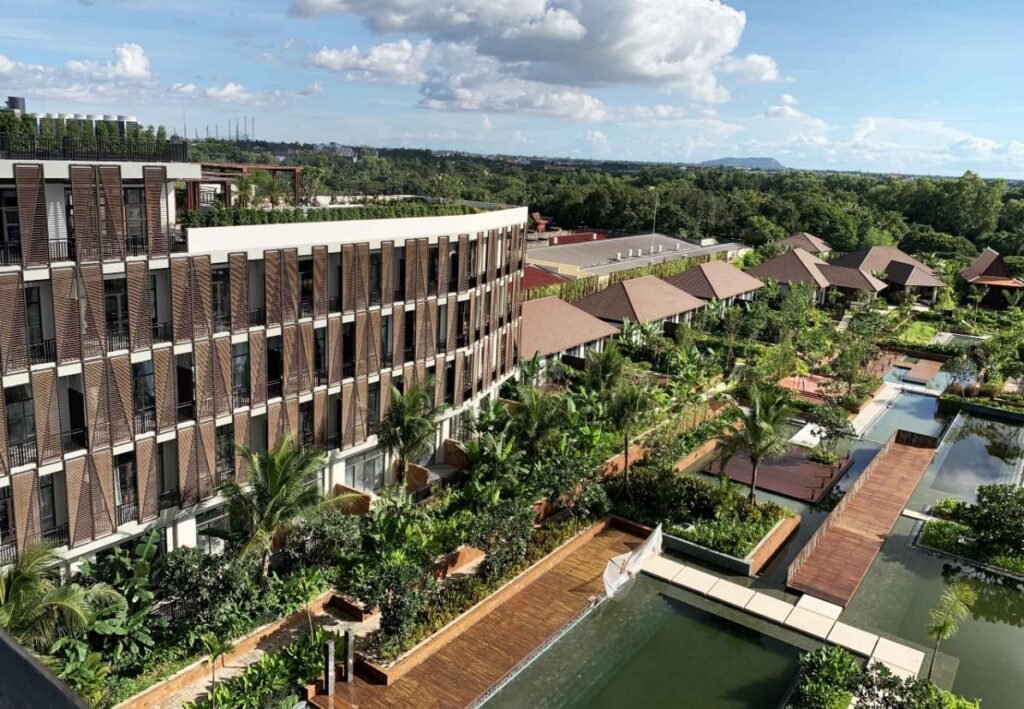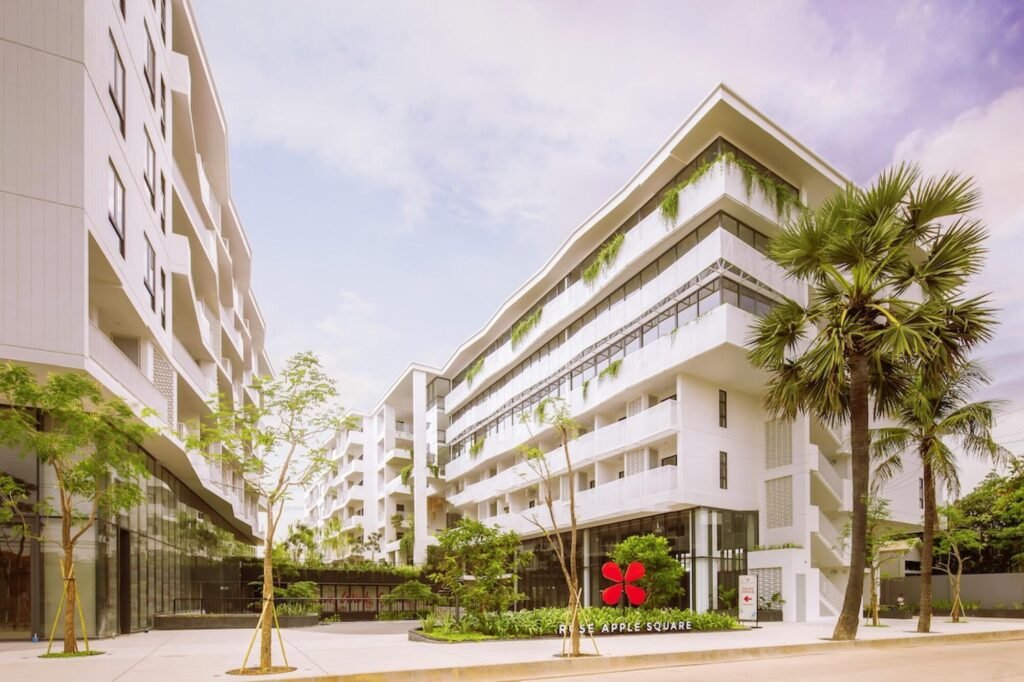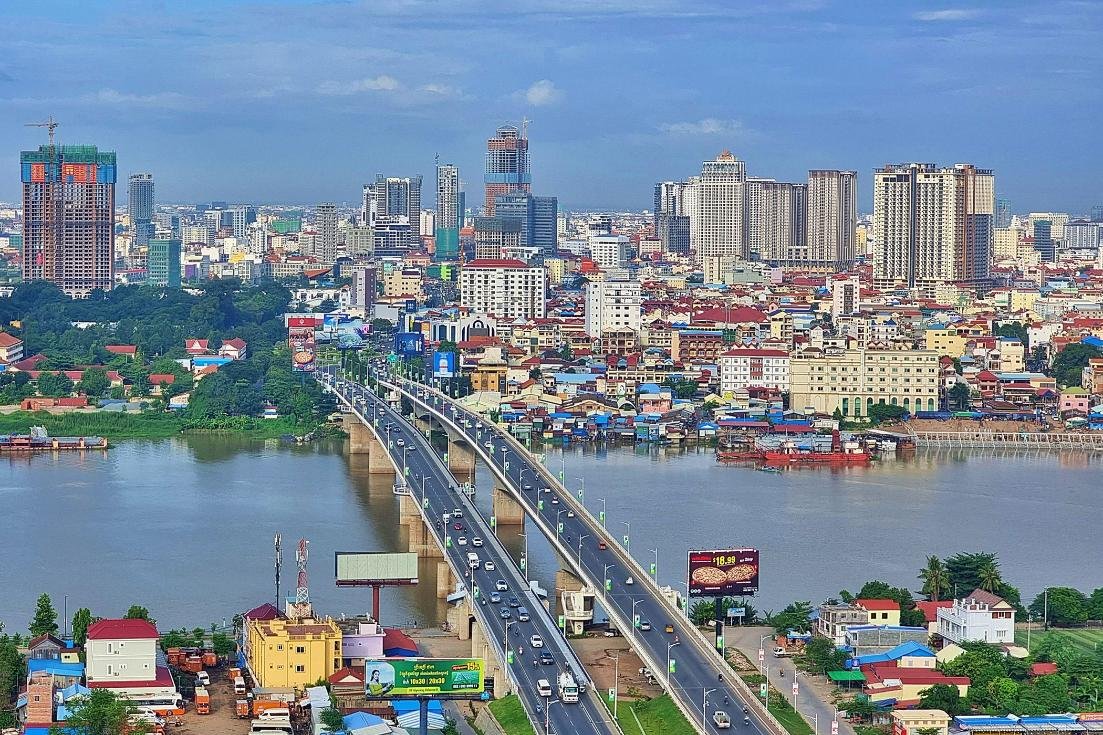Cambodia is becoming a hot spot for property investment in Southeast Asia. Its rapidly growing economy and better infrastructure are drawing investors from around the world.
When thinking about investing in Cambodia’s real estate, you face a big choice. Should you go for Phnom Penh property or Siem Reap property? Both cities have their own special chances, but which one is better?
It’s important to know what each city can offer. This guide will help you see the good points of Phnom Penh property and Siem Reap property. It will help you decide where to put your money.
Key Takeaways
- Cambodia’s economy is growing rapidly, making it an attractive destination for property investment.
- Phnom Penh and Siem Reap offer different investment opportunities.
- Understanding local market trends is key to success.
- Investors should look at infrastructure and tourism growth.
- Comparing property prices and rental yields is vital.
The Current State of Cambodia’s Property Market
The Cambodian real estate sector is booming. This is thanks to strong economic growth and more foreign investment. Knowing the current state of the market is key when considering an investment.
Economic Growth and Market Trends
Cambodia’s economy is growing fast, and real estate is benefiting. The country’s location in Southeast Asia and its tourism growth attract foreign investors. Expect property values to rise, mainly in areas like Phnom Penh property.
Foreign Investment Regulations in Cambodia
Cambodia has rules to help foreign investors in property. For example, foreigners can own condominium units directly. But, other properties need different ownership setups. For more info, check https://www.investasian.com/property-investment/real-estate-in-cambodia/.
Hard Title vs. Soft Title Ownership
Understanding hard title and soft title ownership is vital in Cambodia. Hard title means full ownership and is safer. Soft title might not be as secure and could lead to legal problems. Knowing these differences helps in making better investment choices.
Phnom Penh vs. Siem Reap: A Comparative Look
Phnom Penh and Siem Reap are Cambodia’s top cities for property investment. Each city has its own unique opportunities. Knowing the differences between them is key for investors.
Phnom Penh: The Capital’s Investment Profile
Phnom Penh is Cambodia’s lively capital and the heart of its real estate market. It boasts a growing economy, new infrastructure, and a strong demand for homes and businesses.
Key Neighborhoods for Investment
Some top spots for investment in Phnom Penh are:
- Toul Kork: A fast-growing area with homes and businesses.
- Chamkarmorn: A central district needing more office space.
- Mean Chey: A new area with growth possibilities.
These areas promise good returns due to their prime locations and increasing demand.
Siem Reap: The Tourist Hub’s Investment Landscape
Siem Reap, near Angkor Wat, is a key tourist spot. Its property market thrives on tourism, with a focus on hotels and guesthouses.
Emerging Areas for Property Growth
Siem Reap’s up-and-coming areas for property growth are:
- Pub Street: A lively spot with lots of tourists.
- Wat Bo Road: Ideal for boutique hotels and guesthouses.
- Outskirts of Siem Reap: The city’s edges offer chances for big projects.

Investing in Siem Reap’s property can be very profitable, focusing on areas with lots of tourists.
| City | Investment Profile | Key Areas |
|---|---|---|
| Phnom Penh | Growing economy, infrastructure development | Toul Kork, Chamkarmorn, Mean Chey |
| Siem Reap | Tourism-driven, high demand for hotels and guesthouses | Pub Street, Wat Bo Road, Outskirts |
Key Investment Factors to Consider
Choosing between Phnom Penh and Siem Reap for investment depends on several key factors. It’s important to look at different aspects that can affect your returns and wealth over time.
Property Prices and Appreciation
Property prices in Phnom Penh and Siem Reap are different. This is due to location, type of property, and demand. Phnom Penh, being the capital, has higher prices. But Siem Reap’s property values have grown a lot, thanks to tourism.
Rental Yield Comparison
Rental yields in both cities are good, but they vary. Phnom Penh offers more for commercial properties. Siem Reap does well with tourism-related rentals. Knowing this can help you choose where to invest for better cash flow.
Infrastructure Development Plans
Infrastructure development is key to property values. Both cities are improving their infrastructure, including transport.
Transportation Projects Impact on Property Values
New roads, bridges, and public transport can boost property values. They make areas more accessible and attractive for investment. For example, new highways can make remote areas more appealing.
| Investment Factor | Phnom Penh | Siem Reap |
|---|---|---|
| Average Property Price (per sqm) | $2,500 | $1,800 |
| Rental Yield (%) | 6-8% | 7-9% |
| Infrastructure Development | Significant commercial and residential projects | Tourism-focused infrastructure |
For more information on investing in Cambodia, you can read this article: The 2025 Guide to Cambodia’s Real Estate Market for Investors
Step-by-Step Guide to Property Investment in Cambodia
Cambodia’s property market is drawing UK investors with its promise of high returns. But, it’s key to follow a step-by-step guide for success. Knowing the legal, procedural, and practical sides of investing in Phnom Penh or Siem Reap is essential.
Legal Requirements for Investors
Real estate investors must meet specific legal needs when investing in Cambodian property. This includes registering with the right authorities and getting the needed licenses. Working with a trusted legal advisor is vital to follow Cambodian law.
Also, be aware of the taxes on your investment. Cambodia has rules on property transfer and rental income taxes.
Finding Reliable Property Agents and Developers
Finding trustworthy property agents and developers is key to your investment’s success. Look for those with a good track record and industry association memberships. A reliable agent can offer valuable insights and help you make smart choices.

Due Diligence Process
Thorough due diligence is a must in property investment. This means researching the property’s history, checking the seller’s identity, and making sure the property has no legal issues.
Property Inspection Checklist
- Verify the property’s location and boundaries
- Inspect the property’s condition and any existing damages
- Check for any outstanding debts or liens on the property
- Review local zoning laws and regulations
By using this checklist, you can make sure your investment is safe and well-informed.
Investment Strategies for Each City
Phnom Penh and Siem Reap have different investment scenes. Knowing what makes each city unique is key for investors. This knowledge helps them make smart choices and get the best returns.
Phnom Penh: Commercial vs. Residential Options
In Phnom Penh, you can pick between commercial and residential properties. Commercial properties have high rental returns, thanks to the city’s growing business scene. Residential properties offer steady income from rentals and can also grow in value over time.
Condominium vs. Shophouse Investments
Within these categories, you can choose between condominiums or shophouses. Condominiums are favored by expats and locals for their modern features and safety. Shophouses offer both business and living spaces, making them versatile.
- Condominiums: Great for rental income and value growth
- Shophouses: Perfect for mixed-use projects
Siem Reap: Tourism-Focused Investments
Siem Reap thrives on tourism, making it a prime spot for tourism-focused investments. Properties that cater to tourists can be very profitable.
Boutique Hotels and Vacation Rentals
Boutique hotels and vacation rentals are top choices in Siem Reap. These can be managed on platforms like Airbnb, bringing in consistent income. The growing number of tourists at Angkor Wat temple complex boosts demand for unique stays.
- Boutique hotels: Provide luxury for visitors
- Vacation rentals: Offer flexible stays
Conclusion: Making Your Investment Decision
You now know a lot about investing in Phnom Penh and Siem Reap. Your goals and what you like will help you choose where to invest.
Phnom Penh has many investment chances, like commercial and homes. Siem Reap’s market is mainly driven by tourists. Phnom Penh’s market is more stable, but Siem Reap could grow more because of tourism.
Think about what each city offers and match it with your investment plan. It’s important to do your homework well before investing in either Phnom Penh or Siem Reap.
FAQ
What are the key differences between Phnom Penh and Siem Reap in terms of property investment?
Phnom Penh is the capital and has a diverse economy. It focuses on commercial and residential properties. Siem Reap, on the other hand, is driven by tourism. It’s best for hotels, guesthouses, and tourism-related properties.
What type of property ownership is available in Cambodia?
Cambodia offers two types of property ownership. Hard title gives full ownership rights. Soft title has restrictions, mainly for foreign investors.
What are the legal requirements for UK investors to invest in Cambodian property?
UK investors must follow Cambodian laws. They need to get permits and register their property. Working with reliable agents and developers helps ensure a smooth process.
How do property prices and rental yields compare between Phnom Penh and Siem Reap?
Property prices in Phnom Penh are higher than in Siem Reap. Rental yields vary by location, property type, and demand. Siem Reap often has higher yields due to tourism.
What infrastructure development plans are underway in Cambodia, and how will they impact property values?
Cambodia is improving its infrastructure, including transportation and construction. These upgrades can boost property values by making areas more accessible and attractive.
What are the pros and cons of investing in commercial versus residential properties in Phnom Penh?
Commercial properties in Phnom Penh can have higher rental yields. But, they often require bigger investments. Residential properties offer stable returns but may be affected by market changes.
How can I ensure a successful property investment in Siem Reap’s tourism industry?
To succeed in Siem Reap, understand the local market. Work with trusted agents and developers. Consider location, management, and marketing strategies.
What are the key factors to consider when evaluating property investment opportunities in Phnom Penh and Siem Reap?
Evaluate properties based on prices, rental yields, and infrastructure. Also, consider local demand and the economic outlook for each city.




